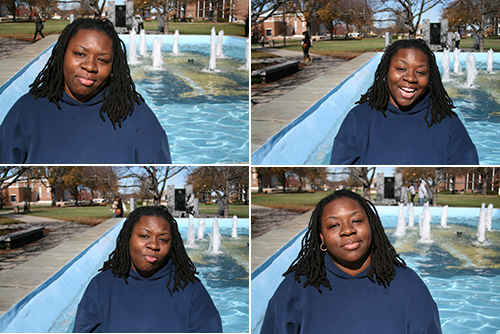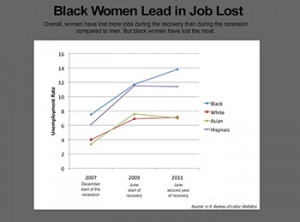Uncategorized
Black Women Fall Further Behind During Recovery
During the Great Recession of 2007, millions of Americans lost their jobs. Now, as the US inches its way toward economic recovery, people are trickling their way back to work. But black women, a group that went into the recession with the second highest unemployment rate in the country, only behind black men, are falling further behind.
According to a recent study by the National Women’s Law Center, during the first two years of the recovery period, June 2009 to June 2011, black women lost more jobs than any other demographic, including black men, who have for decades had the highest unemployment rate in the country. In fact, black women lost twice as many jobs as black men gained during the recovery and they now represent more than 4 in every 10 jobs lost by women.
“Part of it is black women, like women in general, are disproportionately employed in the public sector, which has been hard hit by the recession,” said Joan Entmacher, the National Women’s Law Center’s vice president for family economic security. “But on the flip side, black women are also not doing so well in the private sector, so they’re getting hit by job loss on both ends.”
This is a troubling trend for black women, who according to U.S. Census Bureau statistics, make up a majority of the black workforce at 53.4 percent and are the head of households for the majority of black families with children. According to population statistics, 72 percent of black children are born to unmarried mothers.
“The fact that black women are losing more jobs than any other group can have a devastating impact,” said C. Nicole Mason, PhD., executive director and research assistant professor for New York University’s Wagner School. “There’s a disproportionate amount of black women who are single mothers and when they aren’t employed that has a negative impact on families and the community.”
Mason says since black women are the breadwinners of their families, their unemployment has a negative affect on black businesses that rely on the black dollar, as well as on the social and educational development of their children.
According to a 2010 study from the University of Michigan’s National Poverty Center, children of black, single mothers who have been unemployed for an extended period of time were more likely to drop out of school and develop low self-esteem.
Although black women have lost more jobs than any other group, all women have lost more jobs than men during the first two years of the recovery period.
“Women as a whole aren’t doing worse during the recovery than during the recession, but there was no recovery for them” said Entmacher. “They’re pretty much standing still. But black women have clearly taken the biggest hit because they were already behind.”
Current unemployment numbers, show that black women have seen gains in employment. As of October 2011, black women’s unemployment dropped to 12.6 percent from 13.8 percent in June. This is a good sign, but considering the fact that black women, and the black community as a whole, have been plagued with high numbers of unemployment for years, it may not be enough to make a significant difference to the hundreds of thousands of black women seeking employment.
Tiffany’s Story: Laid off from a struggling industry

Tiffany Jones, 29, always knew she was much more than the sum of her circumstances. Born to a modest-income family in a poor, rural area of North Carolina, at an early age Jones set her sights on doing something no one else in her family had achieved— getting a college degree.
She worked hard through high school and got accepted to North Carolina Agricultural and Technical State University where she majored in journalism. And on December 13, 2003, she became the first person in her family to graduate from college.
With her degree in hand, Jones began working as a journalist, first at the Jackson Sun in Tennessee, then for the past five years at a group of community papers owned by the News & Record in Greensboro, NC. But with the newspaper industry on shaky financial ground, her paper began letting people go in 2007. Then a short time later it laid more people off. The company that owned the News & Record, Landmark, then offered a buyout to dozens of its employees. And finally, came a third layoff. Jones was able to survive all of that and she felt lucky, but she was on the edge thinking she too may be laid off.
Although her layoff didn’t come as a surprise, that didn’t make the news any less devastating.
Jones is being proactive about her unemployment. She’s already got the paperwork filed and she’s moving in with her father to save money. It’s a big adjustment from her carefree, independent life, but right now she has to think about survival and her future. What will she do next? When will she find a new job? But what’s most urgent to her right now is her health.
While she’s trying to remain optimistic about the future, the fact that black women are losing more jobs than they are gaining is making it hard for her to do so.
Dee’s Story: Raising a child on pennies
Less than six months after giving birth to her first child, Dee Davis*, 34, found out that she was losing her job in the marketing department of an online real estate listing agency. Still adjusting to life as a new mother, she found herself thrust into the unemployment line for the first time.
Davis thought it would only take her a few months, if that, to find new employment. She had a college degree and years of experience working in the banking industry. But more than a year later, she is still looking for employment and her funds are running out as she tries to make a comfortable home for herself and her son.
*Name has been changed at request of the interviewee.
Crystal’s Story: Employed, but still struggling
After two years of searching, Crystal Broadnax, 30, has finally found a job. But she is barely able to pay her bills.
“It’s really taking a toll on me,” said Broadnax, who works a low-paying job as a security guard at a university in Durham, NC. “I never thought I would have a job and still be struggling this much.”
She is one of the nearly 8.8 million people in the US who are underemployed, working either part-time jobs or extremely low-paying ones.
Broadnax hoped going back to college would open up more opportunities, and last year she graduated with a degree in English. But so far, no new opportunities have arisen.
“It’s rough out here for everybody right now,” she said. “But it just seems like black women are taking a big hit. I know we’re not alone, but it feels like it sometimes. I just need a break.”
